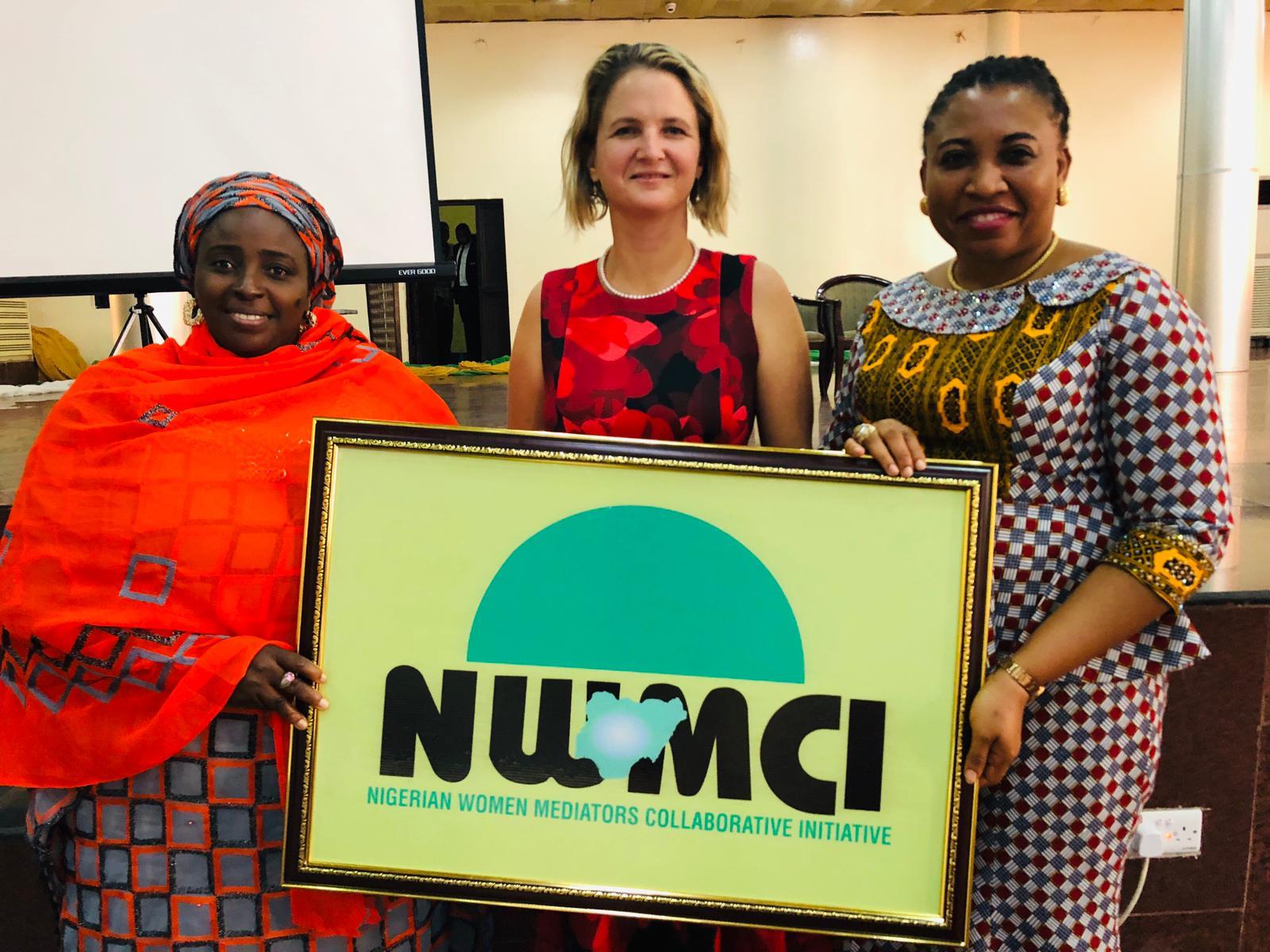Official Launch of the Nigerian Women Mediators Collaborative Initiative (NWMCI)
On 20 September 2019, WILPF Nigeria facilitated the official launch of the Nigerian Women Mediators Collaborative Initiative (NWMCI) in Abuja, Nigeria. Building on a two-day dialogue organised by WILPF Nigeria in December 2018, the Nigerian network aims to identify, train, and support women mediators to prevent and mediate conflicts in their country and across borders, including election-related conflicts and violence.
Almost 140 participants joined the half-day launch. This included participants from the NWMCI and the Women’s Situation Room Nigeria (WSRN), as well as representatives from the Nigerian Ministry for Women and Affairs and Social Development, the Nigeria Policing Programme, ECOWAS, UN Women, the African Women Leader Network, development partners including Norway, Sweden, Switzerland, and France, and other civil society. WILPF’s Women, Peace and Security Programme Director Abigail Ruane participated on behalf of WILPF International.
“The importance of women in peace cannot be underestimated,” ECOWAS Political Affairs Director Remi Ajibewa affirmed, noting that ECOWAS hoped to explore opportunities for collaboration to ensure the goals of the network are achieved. WILPF International President Dr. Joy Onyesoh noted that sometimes women lack capacity, and this is why they are locked out of peace processes. However, women are also locked out due to basic discrimination: “Patriarchy continues to exclude women from peace processes.” According to traditional leader Iyom Josephone Anenih, “Today, patriarchy means that women are invisible and their contributions in all spaces are unrecognised…There is no solution to our nation’s challenges without women. Nothing about us without us. Women must be seen.” UN Women Senior WPS Consultant Semiha Abdulmelik on behalf of UN Women Country Representative Comfort Lamptey noted that we need to change how peace processes are designed and structured, and focus on strategic policy measures that ensure women mediators are built into the peace process.
After the initial session, two reports were shared with participants related to women’s political participation in elections.
The March 2019 “Barriers Faced by Women Candidates in Primary Parties” outlined common barriers to women political candidates in Nigeria and recommendations to overcome these obstacles. “We cannot talk about women’s participation in peace processes without also addressing women’s political participation in elections,” stated Dr. Onyesoh. According to this report, obstacles to women’s political participation in Nigeria include: 1) the role of godfathers in the direct selection process, 2) lack of substantive support from parties and other agents, 3) gender and cultural stereotypes, 4) violence and harassment, 5) fundraising challenges and the cost of fraud, 6) lack of access to media and the impact of online harassment. Recommendations included: 1) implement existing and new legislation, 2) address unequal access to funding, 3) address gender discrimination in negative cultural and traditional norms, 4) address electoral violence that characterizes Nigerian elections, and 5) form an inter-party women’s alliance.
The April 2019 “Gender sensitive reporting in the 2019 Nigerian Elections Media Monitoring Report”, outlined significant gender imbalance in the media around elections. According to the report, significant imbalance exists on many areas, including who are journalists, which candidates are mentioned, which candidates and experts are quoted, and whether or not gender issues are addressed. For example, 33.79% of stories mentioned men candidates by name, while only .39% of stories mentioned women candidates by name, and only 1.75% of stories included mention of issues related to gender (in)equality. “One of our greatest setbacks as women is that our stories have not been heard, despite the important work we are doing,” stated NWMCI Co-Coordinator Lantana. NWMCI network aims to address this gap by documenting and sharing stories of women mediators in the network. “We want to be on the front page, not the Saturday post,” stated Iyom Josephone Anenih. “Women in politics is important.”
The importance of movement building and solidarity from local to global was also a key focus area. “Formal mediation networks cannot be successful without linking up with informal local and national mediation processes,” stated WILPF Women, Peace and Security Programme Director Abigail Ruane in her address to participants. “Sustainable peace requires a local to global approach based on feminist solidarity. It requires linked up leadership across each level that builds momentum for changing society to prevent violence in the home to the community and world.” In between sessions, participants joined together in singing the “Women’s Anthem” which affirmed women’s leadership for equality, development and peace.
During interactive dialogues with the audience, participants highlighted the importance of resolving conflicts at the community level before they escalate, collaborating across movements, promoting intergenerational leadership, and ensuring accountability for male leaders -- who may informally recognise the value of women’s contributions, but need to take this to the next level of demanding these women be included in higher level spaces. Across the board, participants welcomed and affirmed the importance of this network, and shared their willingness to engage and explore partnerships to strengthen women mediators to prevent and mediate conflicts. Moving forward, the network plans to work on capacity building, coaching and mentoring, partnerships, analysis, and media engagement and looks forward to engaging with regional and global mediator networks in advance of the upcoming 20th Anniversary of UNSCR 1325.

